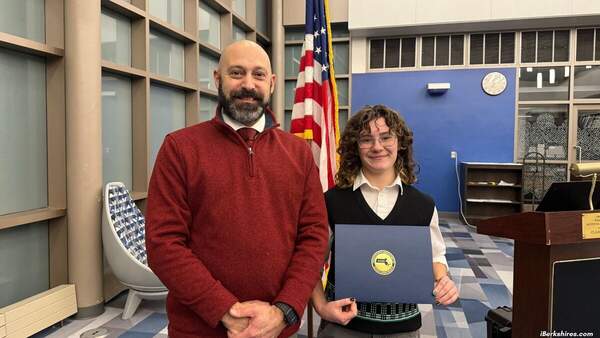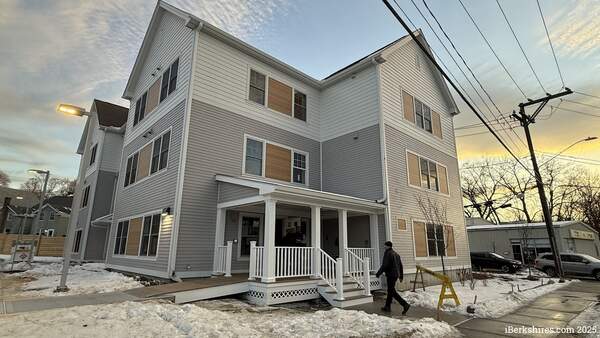
Pittsfield Subcommittee Votes Down 'Redundant' Police Petitions
PITTSFIELD, Mass. — The Ordinances and Rules subcommittee tackled police-related proposals on Monday, ultimately finding them unnecessary.
Committee members voted against two petitions from local attorney Rinaldo Del Gallo on police intervention when a colleague is using unlawful violence because they were seen as redundant or in conflict with state law. It will go back to the full body with a negative recommendation.
Del Gallo requested any on-duty Pittsfield Police officer intervene when another officer engages in unlawful violence against any person and for a local policy on reporting abuse by other law enforcement personnel without fear of retaliation.
"I think the Pittsfield Police Department has been proactive in these and with new state regulations and case law, especially with (the Peace Officer Standards and Training Commission) being implemented at the state level," Councilor at Large Peter White said about the first petition.
"I have always thought that this was not necessary and I hope that people at home can see that we've given this the due diligence."
Del Gallo feels that officers should risk life and limb to protect the public regardless of personal risk and that his proposed ordinances better protect residents.
"The other advantage of a local ordinance is that it is true that under a federal civil rights action, there's case law that says there is a duty to intervene. That's real law. I admit that," he said.
"The problem is you have something called qualified immunity whereas if you make a local ordinance that somebody violates the ordinance, you have a theory of legal liability to that police officer."
State law states:
- A law enforcement officer present and observing another officer using to attempting to use physical force, including deadly force, beyond that which is necessary or objectively reasonable based on the totality of the circumstances shall intervene to prevent the observed officer's use of unnecessary or unreasonable force regardless of the rank of the officer unless intervening would result in imminent harm to the officer or another identifiable individual.
PPD's use of force policy states:
-
Any officer present and observing another law enforcement officer or a member using force that is clearly beyond that which is objectively reasonable under the circumstances shall when in a position to do so, intercede to prevent the use of reasonable force.
- Any officer who observes another law enforcement officer of a member use force that is potentially beyond that which is objectively reasonable under the circumstances should report these observations to a supervisor as soon as feasible and no later than by the end of the observing officer's shift.
Police Capt. Gary Traversa said officers understand the dangers of the job but need to be able to carry out their duties to assist others.
"No officer comes to work with the expectation that they're not going to possibly put their life at risk. It comes with the job," he said.
"We understand that, however, there's a mantra we have: Possibility versus probability. So if we recognize a situation and there's a possibility that we may be injured, that's a big difference to probability. If the probability is high that we're going to put our life at risk then we're no good if we can't help somebody. We need to take care of ourselves to take care of others."
He added that requiring an officer to intervene and unreasonably risk their lives is "unconstitutional and a deprivation of the officers' civil rights."
City Solicitor Stephen Pagnotta said requiring officers to risk their lives is unenforceable and would put the city in a very problematic situation.
"It is not necessary," he said.
"As we've heard this evening, police officers know their duty charged both by their department policies, by statute, and by regulation in the state that they can't ignore abusive behavior by other members of law enforcement whether they be members of the Police Department or other officers and our officers take that role seriously."
A couple of community members attended the meeting to speak in favor of Del Gallo's efforts.
"We all know the current mood of our country and the issues that have occurred in terms of interactions with law enforcement and several communities, but particularly African American community," activist Shirley Edgerton said.
"And I'm supporting this petition, or these petitions, because I think for one we need to be concerned about loopholes and when there are systematic ways of reporting concerns or abuse that may happen in our community."
She added that the city should be specific with its language when talking about reporting abuse and the definitions of necessary force.
"I don't want harm to come to any law enforcement person, but it deeply concerns me if a police officer can say, 'Well, I'm not going in there because I might get hurt,'' Edgerton said.
Ward 6 Councilor Dina Lampiasi recognized where the effort came from.
"I want to be sensitive to the place that this petition came from and the experiences that people in our community and others have experienced," she said.
"We've seen videos on TV from communities unlike ours, we've seen tragic things happen and that's where petitions like this come from."
She asked Traversa what procedure follows an inappropriate use of force.
In use-of-force cases, a supervisor will come to the scene, interview witnesses, and gather evidence to generate a report by the end of the day, he said. If warranted a supervisor would put the officer on leave and a report is sent to the POST Commission within 48 hours.
"The point is that the use of force policy is all-encompassing to include any kind of duty to intervene," Traversa said.
"There are immediate reports, in most incidents of any kind of seriousness there is an immediate investigation, if there is any kind of criminal conduct expected there is a separate criminal investigation."
Tags: ordinance & rules , Pittsfield Police,

.jpg)














